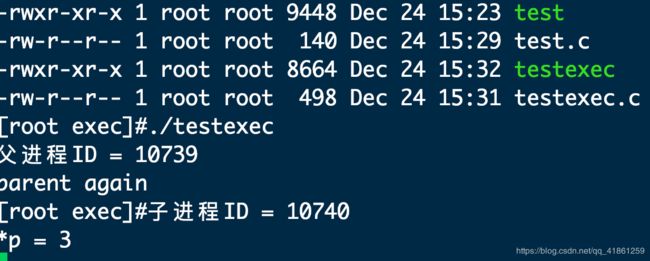Linux下C对进程的操作
文章目录
- 获取当前进程的ID 和父进程ID
- 进程的创建
- 进程间的通信
我将通过代码的方式说明一些进程的基本操作
获取当前进程的ID 和父进程ID
#include执行结果

我们还可以通过查看父进程看下我们的程序是哪一个进程创建的。调用命令ps -ef | grep 20524得到结果-bash啦

进程的创建
linux系统中创建进程采用fork系统调用,fork出来的进程除了pid其他的和父进程一样。为了区分父进程和子进程我们需要判断fork的返回值。失败返回-1,如果是父进程则返回子进程的ID,子进程就会返回0。如果没听明白的话。我们试想一下,父进程P与子进程C的程序是一样的,我们创建C肯定是为了执行不一样的任务。一样的代码如何执行不同的任务?所以就需要fork的返回值()来做分支判断。如果是0说明当前运行的是子进程C,就调用fork==0的分支,否则当前就是父进程在运行,就执行其他的。下面看代码:
#include执行结果

我们刚才说到了根据fork()返回值判断是子进程还是父进程,那么我们创建了子进程过后。如何执行不同的程序呢?可以使用exec族的系统调用,共有六个函数
- int execl(const char *path, const char *arg, …);
- int execlp(const char *file, const char *arg, …);
- int execle(const char *path, const char *arg, …, char *const
envp[]); - int execv(const char *path, char *const argv[]);
- int execvp(const char *file, char *const argv[]);
- int execve(const char *path, char *const argv[], char *const envp[]);
调用exec时进程被新的执行程序替代,然后从main开始执行,下面我们看一个例子:
创建test.c testexec.c文件,通过testexec.c中创建的子进程调用test的可执行文件,代码如下:
#test.c文件
#include#testexec.c文件
#include从下图的执行结果我们可以看到成功的调用的test文件并且输出了3

进程间的通信
我们都知道进程间的通信包括管道、信号量、共享内存、消息队列、Socket的方式,但是我们可能都停留在理论的层面,所以用消息队列来做个实践。我们可以使用ipcs查看系统IPC

可以通过msgget()建立或者访问消息队列,通过msgsnd和msgrcv发送读取消息
通过一个例子说明,包括消息发送端和消息接受端
#发送端的程序,模拟消息队列的发送操作
#include#模拟消息的接受
#include


